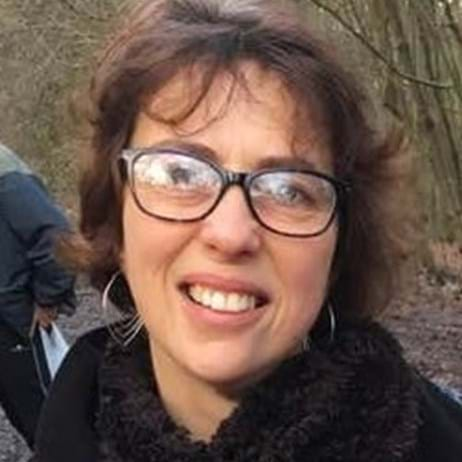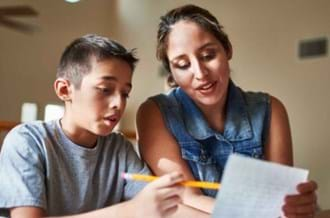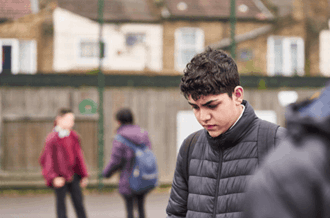Managing the expectations and challenges of parenthood
Managing the expectations and challenges of parenthood

Karen Stocks
Place2Be Clinician and Trainer - Karen is a qualified BACP Accredited Counsellor with over 20 years' experience working with children and families. Karen has worked for Place2Be for 12 years' in managerial and clinical roles. She is now a Place2Be Trainer, where she writes content and delivers programmes to schools, Place2Be internal staff and Place2Be professional counselling training.
This Maternal Mental Health Week, Place2Be Clinician and Trainer, Karen Stocks, reflects on the expectations and challenges of parenthood.
"When I was five, I was a confident mother. My baby arrived in a bag along with second-hand clothes from the neighbour across the road, whose daughter had outgrown both. I named her Jemima.
"She had flattened, balding, blond hair. Her mouth was stained blue, where my neighbour’s daughter had given her a felt-pen for a baby bottle. I was confident I knew how to look after her. I was now a proud mother!
"I fed, dressed and put Jemima to bed in a cot so small, I had to force her head and feet to fit into it. My Mum folded my father’s over-sized handkerchiefs into cloth nappies and fastened them with a safety pin. I bathed Jemima in the washing-up bowl and then pulled her legs off so that the water could run out of her stiff plastic body, and rubbery arms and legs.
"As far as I was concerned, Jemima was well looked after and I was a good Mum. I even feel love for her now as I tell you about her so fondly. The helpful thing about Jemima was that she never cried - unless I decided to make crying noises for her. She was unaffected when I would leave her to play with my other toys. Jemima was undemanding.
"Of course, Jemima was a doll! Her existence entirely depended on my imagination. It was easy to love and care for Jemima. She didn’t really need me.
"When I became a real mother, I hadn’t considered how different my own child would be from Jemima. I was full of maternal dreaming, like in a fairy tale where everyone lives happily ever after. Pregnant me was excited and confident, but around the corner there was a different experience. I was still young and I had hardly started to be an adult.
"My relationship with my children’s father was still in the early stages of getting to know each other, and we weren’t stable. When our first baby was born, we were both dealing with some difficult family issues and loss. My daughter arrived after a worrying caesarean section birth. Feeding her was not straightforward, and there were medical concerns that mattered more than a doll’s balding hair and blue lips.
"How do we develop into parenthood? When the time comes and we hold our baby in our arms, we seek to understand the needs of our baby. We draw upon our own experiences of needs, while learning from other parents, reading parenting books or listening to podcasts. We then bring all that we are at that point in our lives to the role of being a parent, just as I did aged five.
"While it is clear that five-year-old me could practice my parenting without any impact on Jemima, when we have a real child in our care, there is a lot more at stake.
"I now have three daughters in their twenties. Being their mother has brought the biggest joys and the biggest struggles. To my bewilderment, I began to discover that it was my job alongside their fathers, to make sure that they were looked after and that they felt safe in the world. Whether I had the answers or not, they were vulnerable and were reliant on me.
"Parenting is a complex process. A small child or a sprouting teenager, they all need a parent figure. They seek out their needs to be met in many ways, which can sometimes be difficult. They are completely dependent on the response they receive.
"I gradually realised that the most important thing my children needed was me. They need me to play with them, to help them grow, to listen to them, and to be there for them when they come looking for me.
"I knew that, unlike Jemima, it wasn't acceptable to leave them alone. When I became a parent, at first I found it difficult to understand what they required, or how I needed to respond. I was still learning how to care for my own needs.
"I am doing the best I can with who I am. I have never felt like a confident mother, but that hasn't stopped me seeking growth and wanting to develop my parenting skills.
"I am grateful for those who filled the gaps when I wasn't capable. There have been teachers, youth-leaders and other adults who have given to my daughters when they were not being heard enough by both their father and myself.
"They are now past the age I was when I became a mother. My daughters have seen me struggle. They know it’s ok to be real, to feel deeply and to ask for help."
Place2Be's Parenting Smart offers practical advice for parents and carers of children aged 4-11. Visit the website to read our free advice, and find the answers to some common parenting questions.
News & blogs

Why self-awareness is as important in parenting as it is for children
We share examples of how self-awareness can help you grow as a parent and get the best out of you and your child.
Read more
Walking through pain
Place2Be's Programme Leader for Family Work, Judah, reflects on his experience of the importance of listening.
Read more
10 tips for nurturing the wellbeing of LGBTQ+ young people
Place2Be's Plus+ Group shares their tips and advice on how to create safe environments for LGBTQ+ children and young people.
Read more



